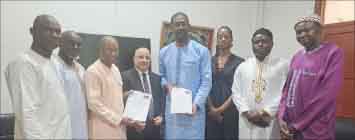By Ebrima S. Jallow
An Islamic Development Bank (IsDB) Group Mission visited Banjul, from 18 to 22 September 2023 to formulate IsDB Group Country Engagement Framework 2024-2026, and to develop the project pipeline for The Gambia for 2024.
The objectives of the mission were to review current economic development trends; discuss development priorities with line ministries/agencies; identify programmes for cooperation with development partners based in The Gambia; present and agree upon the Country Engagement Framework’s (CEF) strategy, priorities, and timeline; and develop a pipeline of potential programmes and projects for The Gambia CEF 2024-2026, based on the country’s priorities and lessons learned in the implementation of IsDB approved projects.
During the course of the engagements, the IsDB Group Mission delegates held discussions with affected government ministries, private sector entities, and parastatals.
With a key focus on supporting The Gambia’s sustainable and resilient growth, this IsDB Group programmin exercise is aligned with the current priorities of the GoTG as per the new National Development Plan 2023-2027 and IsDB Strategic Realignment 2023-2025.
As part of The Gambia’s Country Engagement Frameworks 2024-2026, the IsDB’s primary objective will be to accelerate green economic and social transformation and build resilience to shocks in order to improve the lives of Gambians.
Given the growing demand for Islamic banking products and The Gambia’s need to finance development, IsDB will engage with the Central Bank of The Gambia, AGIB Bank, and other development institutions to leverage its competitive advantage in providing alternative financing to its Marginal Costs. IsDB Group will consider the possibility of introducing ‘Awqaf’ (endowment) operations in The Gambia to ensure a sustainable way of operating social projects with the active participation of NGOs and the social business community.
In a meeting with the World Bank, the mission discussed their recently developed engagement strategy and potential collaboration areas. It was agreed that both parties will potentially collaborate on the key following sectors: energy, agriculture, and human capital/development in particular education and transport.
The rolling three-year pipeline is subject to annual review by both parties.

